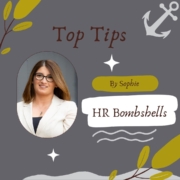Pregnancy Notification: The Employer’s Guide
Pregnancy Notification: The Employer’s Guide
Telling an employer that you are pregnant can be a nerve-wracking experience, many women don’t know what to expect and they are not sure how their employer will react, they may also be worried that they will be asked questions about their plans for work and childcare, when they may not know the answer themselves!
How you handle a pregnancy notification can set the scene for your future relationship with the employee, our top tips should help you navigate what can be a complicated process:
- Congratulate the employee! It may sound obvious, but it is something many employers miss, their first thought often being how they will manage without a potentially key employee for up to 12 months.
- Maintain confidence, if you have been told in confidence, it should go without saying that you should not be telling the rest of the workforce until the employee is happy for it to become common knowledge.
- Naturally you may be concerned about meeting operational requirements, particularly if you have a small team or it is a key employee- don’t panic! There is time to work through the plans for the employee and the business, do not make the employee feel guilty, instead consider involving the employee in the planning and preparation for their maternity to ease the transition for everyone involved and to reassure the employee that they are part of the process and not simply being replaced
- Ensure that you have the key information that you will need to get ready for maternity leave:
- Baby’s due date
- Any antenatal appointment dates
- Provisional date for maternity leave to start
- (Eventually) provisional date for return to work
- Brief your payroll
Remember these are not conversations you need to have immediately; the employee may not know when their appointments will be or when they want to start maternity. Make sure you have kept in touch with HR about what you need and when (we have a handy timeline for guidance!) and make sure you understand what the employee’s rights are in respect of appointments, pregnancy related sickness, holidays, bonuses, company cars etc…
- Remember maternity leave affects more than just the pregnant employee, they may need to take on additional work, train a temporary staff member, or even adjust to that person not being in the workplace for a while if you have a close-knit team. Make sure the team are aware of the plan in terms of changes to the team and work allocation. Communication is the key!
Read our full Maternity Leave & Pay Guide






